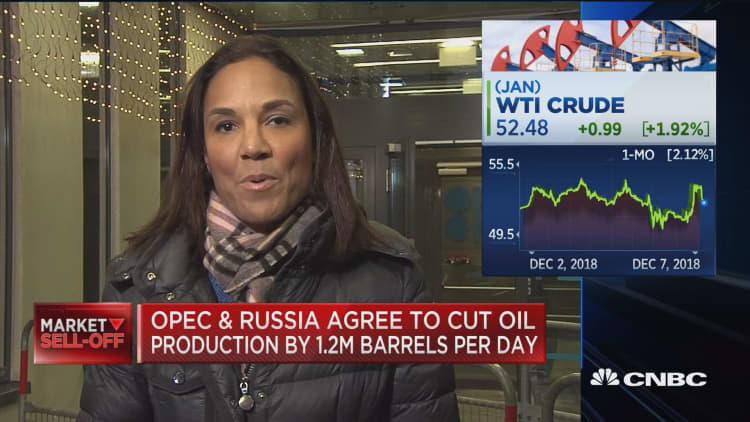Oil prices fell 3 percent on Monday, echoing the weakness in global stock markets as the focus returned to demand growth concerns. Crude prices erased the gains they made on Friday following an OPEC-led decision to cut output.
Losses in Europe and Asia extended to Wall Street on new signs the U.S.-China trade spat was impacting world economic growth.
The market was also weighed down by confusion stemming from British Prime Minister Theresa May's postponement of a parliamentary vote on her Brexit deal and sluggish data from the world's largest economies including the U.S, China, Japan and Germany in recent days.
"The stock market and oil market correlation is back on today," said John Kilduff, a partner at Again Capital Management in New York. "These worries about the global economy and the demand outlook that follows on that for oil are a bigger and bigger negative for the market."
U.S. West Texas Intermediate crude ended Monday's session down $1.61, or 3.1 percent, at $51 a barrel. International Brent crude oil futures fell $1.68, or 2.7 percent, to $59.99 a barrel by 2:20 p.m. ET.

Prices rose on Friday after OPEC and some non-OPEC producers including heavyweight Russia said they would cut oil supply by 1.2 million barrels per day.
"Friday's agreement was a seemingly good one, or maybe we should say the best one under the current circumstances," Tamas Varga, a strategist with PVM Oil Associates, said.
"As good as it looks, our view is that it will not be able to provide long-term price supports because it could not help global oil inventories deplete."
Global equities have fallen by nearly 8 percent so far this year, battered by concern about slowing corporate earnings and the threat to the broader economy from an escalating trade dispute between the United States and China.
A steep increase in the pace of crude supply growth this year, especially in the world's three largest producers — the United States, Saudi Arabia and Russia — has made a number of analysts wary about the prospect of demand being sufficient to mop up extra oil.
"The surge in U.S. supply in recent months should be a reason for caution," Bank of America Merrill Lynch said in a note on Monday.
U.S. bank Morgan Stanley said the cut was "likely sufficient to balance the market in 1H19 and prevent inventories from building."

Not all analysts were so confident.
Edward Bell of Emirates NBD bank said "the scale of the cuts ... isn't enough to push the market back into deficit" and that he expected "a market surplus of around 1.2 million bpd in Q1 with the new production levels."
Conflicting demand signals
Oil prices have fallen sharply since October on signs of an economic slowdown, with Brent losing almost 30 percent in value.
Japan, the world's No.4 oil consumer, on Monday revised its third quarter GDP growth down to an annualised rate of minus 2.5 percent, down from the initial estimate of minus 1.2 percent.
Meanwhile, the two world's biggest economies — the United States and China — are locked in a trade war which is threatening to slow global growth and battering investor sentiment.
Despite the expectations of a slowdown, demand on the ground remains healthy.
China, the world's biggest oil importer, over the weekend reported November crude imports rose 8.5 percent from a year ago, to 10.43 million bpd, marking the first time China imported more than 10 million bpd. That leaves the world's second-biggest economy on track to set yet another annual import record.
Demand is driven by Chinese purchases for strategic reserves, but also by new refineries, triggering excess supply of fuels, filling up storage tanks and eroding refinery profits across Asia.
— CNBC's Tom DiChristopher contributed to this report.

